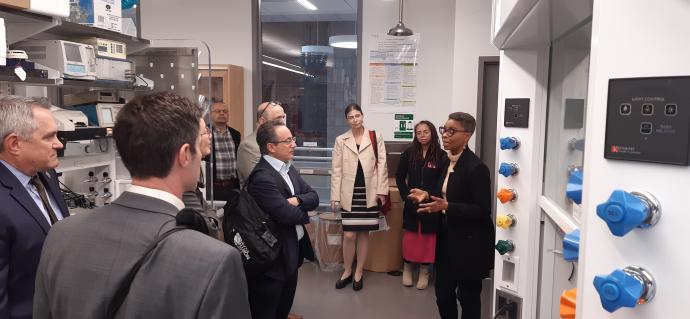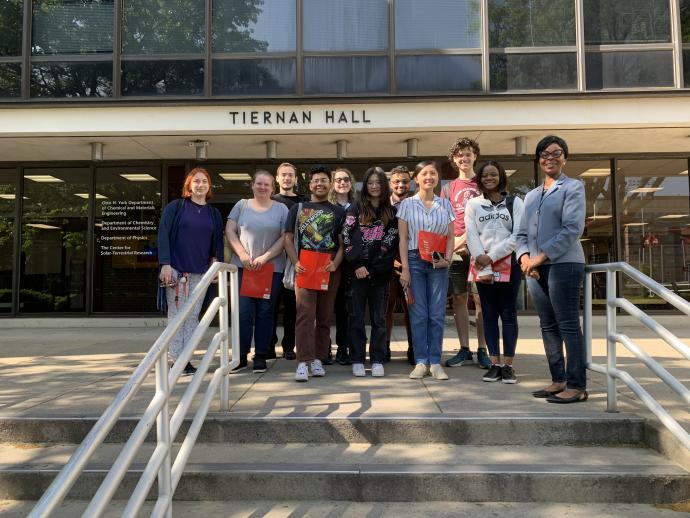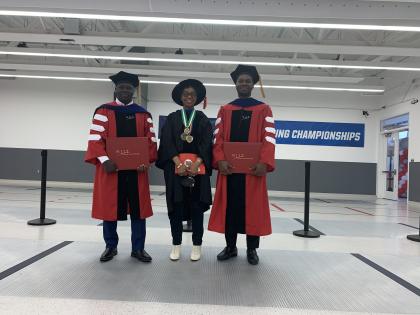News
Stephen J. Kurilla Inspires Young Minds at Beachwood Elementary School

On June 5, 2024, Stephen J. Kurilla, a dedicated Ph.D. student and researcher at the BioSMART Center under the mentorship of Prof. Wunmi Sadik, visited Beachwood Elementary School to inspire and educate young minds about the exciting world of science.
Stephen J. Kurilla's visit to the elementary school was a part of BioSMART's outreach program aimed at fostering an early interest in science and technology among students. The program provides students with opportunities to interact with real scientists and researchers, helping to demystify complex scientific concepts and spark curiosity about the natural world.
During his visit, Kurilla engaged the students with interactive demonstrations and discussions, focusing on various aspects of chemistry and environmental science. His presentations were designed to be both informative and entertaining, ensuring that the young students could grasp and enjoy the scientific content.
Kurilla's passion for science and education was evident as he shared stories from his own academic journey, emphasizing the importance of perseverance, curiosity, and continuous learning. The students were particularly fascinated by his research in biosensors and sustainable technologies, areas where Kurilla has made significant contributions under Prof. Sadik's guidance.
The visit was a great success, with students expressing enthusiasm and asking numerous questions, eager to learn more about the world of science. Teachers and staff at Beachwood Elementary School also praised Kurilla's ability to connect with the students and make science accessible and exciting.
Stephen J. Kurilla's outreach efforts exemplify the BioSMART Center's commitment to community engagement and education. By inspiring the next generation of scientists, BioSMART aims to contribute to a future where innovation and scientific literacy are highly valued.
For media inquiries or further information, please contact
Huize Xue - hx67@njit.edu
Prof. Wunmi Sadik Receives the 2023 UOW Alumni Award for Research & Scholarship
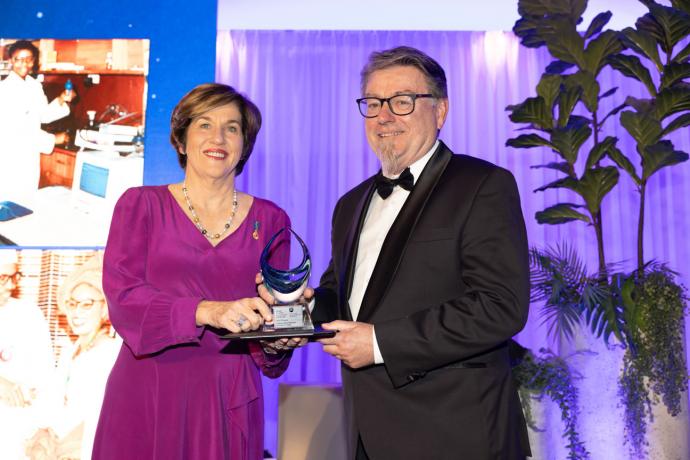
We are thrilled to announce a remarkable achievement within the BioSMART community. Our very own Professor Wunmi Sadik has been honored with the prestigious 2023 UOW Alumni Award for Research & Scholarship.
This accolade, a testament to Prof. Sadik's dedication and exceptional contributions to the fields of chemistry and environmental science, underscores her unwavering commitment to advancing knowledge and fostering innovation.
Prof. Sadik was unable to receive the award in person. Instead, the honor was graciously accepted on her behalf by Professor Gordon Wallace.
More photos from the event are available on our Facebook page – Take a look! (URL:https://www.facebook.com/media/set?set=a.704273015059582&type=3)
There are also a number of articles on socials that hopefully have seen. Including this one on Linked In. (URL:https://www.linkedin.com/posts/university-of-wollongong_perfect-chemistr...)
BioSMART Welcomes Distinguished Guests from Rowan University
On October 9, 2023, BioSMART Center, a hub of innovation and research excellence, recently had the privilege of hosting distinguished visitors from Rowan University. The visit, which took place on a busy day despite Columbus Day, provided an excellent opportunity for sharing and discussing cutting-edge research initiatives.
The visitors, led by Dr. Mei Wei, Vice President for Research at Rowan University, were greeted by a warm and enthusiastic team of researchers at the BioSMART Center. Dr. Wei was accompanied by a group of prominent individuals from Rowan University, including Dr. Mark Byrne, Dean of the School of Translational Biomedical Engineering and Sciences; Dr. Richard Jermyn, Dean of the School of Osteopathic Medicine; Dr. Omar Tliba, Associate Dean for Research and Graduate Studies in the School of Veterinary Medicine; Dr. Darren Boehning, Managerial Head of Biomedical Sciences; Dr. Giuseppe Palmese, Dean of the Henry M. Rowan College of Engineering; and Dr. Vojislava Pophristic, Dean of the College of Science and Mathematics.
The visit included an informative walk-through of the lab and presentations by BioSMART researchers, highlighting their groundbreaking research projects. Each researcher provided a brief, yet engaging, five-minute presentation to the visitors, outlining the key aspects of their work.
The visit was an excellent opportunity for knowledge exchange and collaboration. The BioSMART team is deeply grateful to the visitors from Rowan University for their time and interest in the center's research initiatives.
This visit exemplifies the spirit of collaboration and innovation that drives the BioSMART Center's mission to address critical challenges in chemistry and environmental science. The center remains committed to advancing knowledge and fostering interdisciplinary research that has a global impact.
Dr. Paul Westerhoff at BioSMART Center
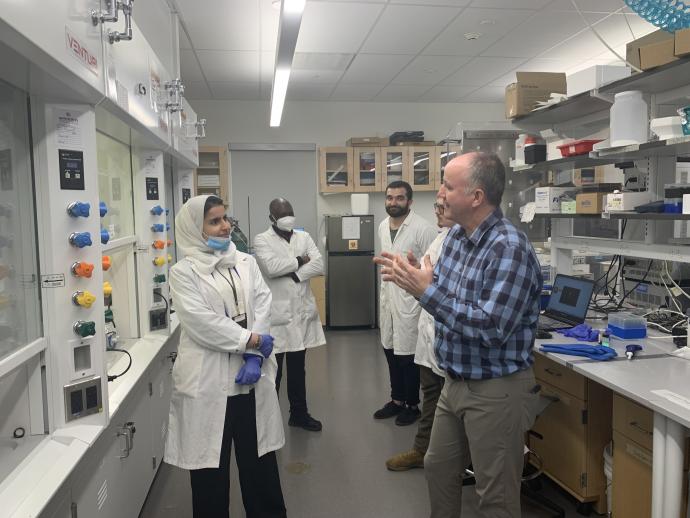
On September 27, 2023, the BioSMART Center had the privilege of hosting Dr. Paul Westerhoff, a distinguished figure in the field of environmental engineering. Dr. Westerhoff serves as the Regents Professor in the School of Sustainable Engineering and the Built Environment at Arizona State University and holds the prestigious Fulton Chair of Environmental Engineering.
Having joined Arizona State University in 1995, Dr. Westerhoff has established himself as an influential environmental engineer. His extensive career and commitment to research align seamlessly with the mission of the BioSMART Center, which focuses on advancing knowledge in biosensors, nanomaterials, and sustainable technologies.
During the event, Dr. Westerhoff shared insights into his research and discussed the latest advancements in environmental engineering. His presentation addressed critical topics related to sustainability, emphasizing the importance of innovative approaches to address the environmental challenges of our time.
Dr. Westerhoff's work aligns seamlessly with the mission of the BioSMART Center, which is dedicated to advancing research in biosensors, nanomaterials, and sustainable technologies. The event fostered valuable discussions and highlighted the significance of interdisciplinary collaboration in tackling complex environmental issues.
The BioSMART Center extends its sincere gratitude to Dr. Paul Westerhoff for his enlightening presentation and for contributing to the center's ongoing commitment to cutting-edge research in the fields of chemistry and environmental science.
NJIT Professor Omowunmi Sadik Named 2023 American Chemical Society Fellow
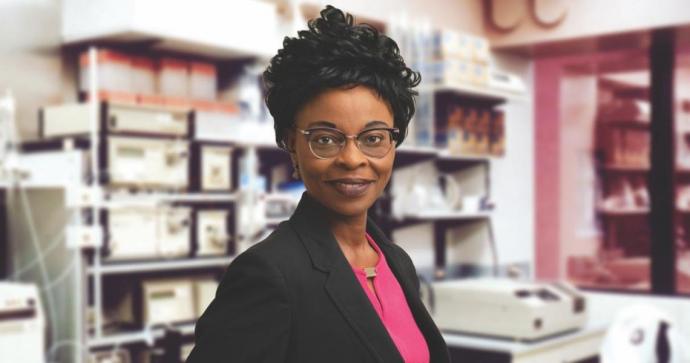
NJIT Distinguished Professor of Chemistry Omowunmi Sadik has earned the exclusive distinction of being named Fellow by one of the largest scientific organizations globally, the American Chemical Society (ACS).
Sadik's “outstanding contributions to science, the profession, and ACS” over her 30-year career earned her selection into ACS's 2023 class of 42 fellows, which was recently recognized at the Society’s Fellow Ceremony in San Francisco.
ACS established its Fellows Program in 2008 to annually recognize members for exemplary professional achievements and service to the Society. Of its more than 173,000 members around the world, less than 1% have been recognized with the designation.
Sadik is just the third faculty member at NJIT to be presented with the honor, following biomedical engineering professor Michael Jaffe and College of Science and Liberal Arts Dean Kevin Belfield.
“I'm incredibly honored for this prestigious award and recognition of my work and leadership. It is a validation of the work of so many highly talented members of the Sadik Group, past and present,” said Sadik.
“It was a great feeling to be in the company of highly accomplished women like Carolyn R. Bertozzi (Stanford University and 2022 Nobel Prize Winner in Chemistry), Cynthia M. Friend (Harvard University), Jacqueline K. Barton (Caltech), Vicky Grassian (UC San Diego) and Catherine J. Murphy (UW-Madison). It’s quite an honor in this very competitive year.”
Sadik established NJIT's BioSensor Materials for Advanced Research and Technology (BioSMART) Center and has continued her trailblazing work in the field of surface chemistry and the development of innovative biosensing technologies, which have been used for everything from bomb detection and monitoring the environment to cancer and COVID-19 detection.
The ACS cited Sadik's significant scientific contributions, including "visionary leadership in green synthesis, nanosensors, and nanomaterials to improve sustainable applications, human health and the environment.”
To date, Sadik’s research in biosensors and bioanalytical chemistry has resulted in five US patents, over 200 peer-reviewed papers, and has been featured through more than 400 invited lectures and conference contributions worldwide.
Recently, Sadik has led new biosensor research for accurately measuring pain biomarkers in the human body, a development which could significantly improve clinical practitioner's ability to manage pain and reduce cases of addiction in patients.
Along with her research achievements, Sadik has held numerous leadership roles with the ACS and was credited by the society as the founder of its Division of Agricultural and Food Chemistry/Sustainability and Green Technology subdivision.
Sadik was also recognized for her contributions to education for the next generation of chemists. To date, she has mentored 41 graduate students, 16 postdoctoral fellows and a host of undergraduate mentees.
Sadik's ACS Fellow designation follows a substantial list of accolades and honorable distinctions, which include Harvard University's Distinguished Radcliffe Fellowship, the NSF Discovery Corps Senior Fellowship, Jefferson Fellow and the Nigerian National Order of Merit Award (NNOM). She has also been elected a fellow of the Royal Society of Chemistry (2010) and the American Institute for Medical and Biological Engineering (2012).
Written by: Jesse Jenkins
Published: Tuesday, September 5, 2023
NJIT BioSMART REU 2023 Students Showcase Research at NJIT URI Symposium
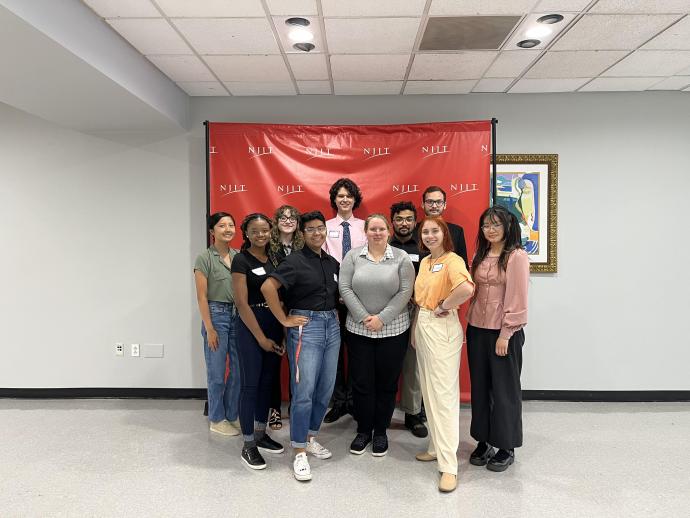
On July 27, 2023, the 2023 BioSMART Research Experience for Undergraduates (REU) students from the New Jersey Institute of Technology (NJIT) participated in the prestigious NJIT Undergraduate Research and Innovation (URI) Symposium.
The NJIT URI Symposium provided a platform for undergraduate researchers to present their work, exchange ideas, and engage with the broader academic community. This event allowed the BioSMART REU students to showcase their research findings and contributions to the fields of chemistry and environmental science.
During the symposium, the NJIT BioSMART REU students presented their innovative research projects, which encompassed a diverse range of topics, including biosensors, nanomaterials, environmental monitoring, and sustainable technologies. Their presentations highlighted the significant impact of their work on addressing real-world challenges and advancing scientific knowledge.
The symposium attendees were impressed by the depth and breadth of the research conducted by the BioSMART REU students. Their dedication, creativity, and interdisciplinary approach garnered attention and praise from faculty members, researchers, and fellow students.
For additional information about the NJIT BioSMART REU program and the university's dedication to undergraduate research, interested parties can reach out to [Dr./Prof. Omowunmi Sadik] at [omowunmi.sadik@njit.edu].
The interdisciplinary innovator on moving beyond silos and communicating the real-world impact of chemistry
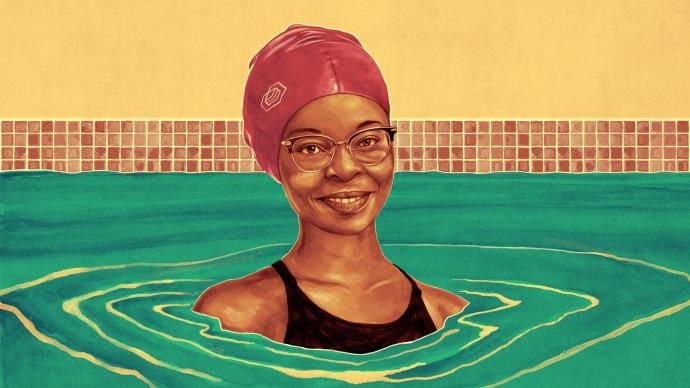
Wunmi Sadik is a distinguished professor and chair in the Department of Chemistry and Environmental Science at the New Jersey Institutes of Technology (NJIT). She is also the director of the NJIT BioSMART Center. Sadik is internationally known for her creativity in developing innovative biosensors for different applications – from environmental monitoring to early cancer detection and objective pain assessment. She is a leading expert in point-of-care (POC) biomedical devices, nanomaterials, and sustainable and green technologies. She was the inaugural chair of the Gordon Conference on Environmental Nanotechnology and co-founded the Sustainable Nanotechnology Organization(SNO).
I come from a family that really encouraged me to enter into the sciences. My dad was very, very encouraging. My older brother was my first contact with chemistry. He would come home from school and tell me about Boyle’s law and Charles’ law. I would look at his textbooks and just start to read, fascinated. I also remember my first chemistry teacher, in form three (age 12–13). He showed us all different apparatuses, and I was captivated.
When I decided on chemistry as a major at university, I had never met a practicing chemist. I simply enjoyed chemistry, and I found that it challenged me in a very positive way.
It was a challenge to convince my mother that chemistry was worth studying at university. She did not understand the concept of chemistry. With my own minimal knowledge of chemistry at the time, I struggled to explain what chemistry was all about. Nigeria is a petroleum-exporting country, so I started by explaining where the kerosene she used to cook came from and progressed from there. Her conclusion: ‘If anybody is willing to pay you to work as a chemist, then it’s probably worth doing.’
I like to think about my work in terms of innovation and problem-solving. What can we do differently? How can we use what is already known to solve another problem? My philosophy is to explain how chemistry permeates the world around us, how it is not confined to a lab or a refinery, and that it offers solutions that don’t just come in flasks. I do a lot of work with engineers using computer simulations. I like to look at how to take our research beyond the mathematical/computational simulation to real-life solutions. It goes back to how I tried to explain things to my mother all those years ago.
Ideas exist in silos, despite our best efforts. Departments are structured based on independent fields of study. However, this organizational structure inadequately describes many areas of study. This has slowly started to improve. Traditionally, chemistry has been categorised into analytical, physical, organic, and inorganic chemistry. In the last few years, the United States National Science Foundation (NSF) has restructured the division of chemistry into interdisciplinary areas. There is an emphasis on transdisciplinary and translational science and technology geared more toward the application or even the interdisciplinary branches, such as environmental chemical sciences and sustainability.
I am a collaborative leader. I have a passion for what I do. I get energy from my students and my postdoctoral fellows. I always try to assign them to projects that they are passionate about because I know that’s when they will be at their very best.
Picture drawn by Peter Strain (Début Art).
Article edited by Emma Pewsey.
You can find the original article at: https://www.chemistryworld.com/culture/wunmi-sadik-i-still-see-myself-as...
NJIT BioSMART Welcomes the 2023 Cohorts of NSF REU Students
Professor Sadik with REU students, May 2023
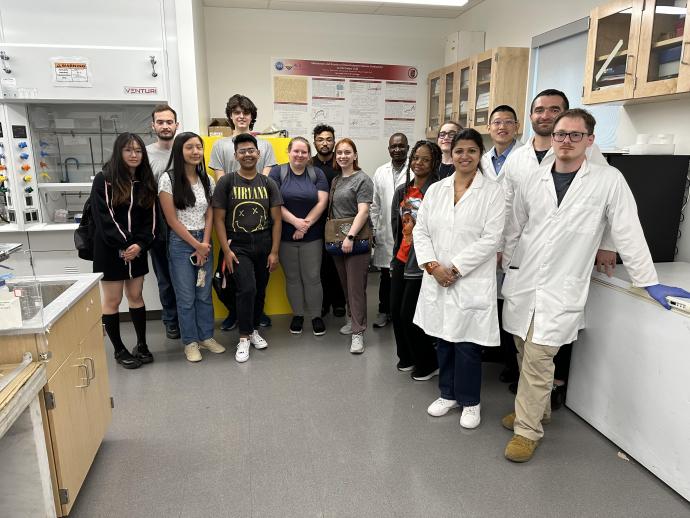
REU students at BioSmart Lab, June 2023
The NJIT BioSMART Center recently welcomes a new cohort of 2023 REU students. The REU Sites program, funded by the National Science Foundation (NSF), offers undergraduate students the unique opportunity to engage in cutting-edge research within the host institution. Under the guidance of faculty members and experienced researchers, participants work on specific research projects, gaining valuable hands-on experience and exposure to the scientific research process.
Throughout the duration of the program, a select group of undergraduate students from various academic institutions worked closely with faculty members and researchers associated with the NJIT BioSMART Center at NJIT. The students are immersed in a diverse range of research projects that spanned interdisciplinary fields such as bioanalytical chemistry, nanotechnology, biosensors, and environmental monitoring.
The REU program fosters a collaborative learning environment, allowing students to develop critical thinking skills, strengthen their scientific knowledge, and gain hands-on experience in conducting research. These experiences not only contribute to the student's academic growth but also provide valuable insights into potential career paths within the STEM fields.
Welcoming the 2023 class, Dean Kevin Belfield, co-PI on the NSF grant expressed his pride in the accomplishments of the participating students, stating, "The REU Sites program offers a unique opportunity for undergraduate students to delve into the world of scientific research and make meaningful contributions to their respective fields."
The BioSMART Center looks forward to continuing its commitment to advancing scientific knowledge and inspiring future researchers.
Dr. Daniel Isika and Dr. Gaddi Eshun Successfully Earn Their Ph.D. Degrees
It is with great pleasure that we announce the successful completion of the doctoral degrees of Dr. Daniel Isika and Dr. Gaddi Eshun, members of the esteemed research group led by Distinguished Professor Dr. Omowunmi Sadik in the Department of Chemistry and Environmental Sciences at the New Jersey Institute of Technology (NJIT).
Under the expert guidance of Distinguished Professor Dr. Omowunmi Sadik, these talented researchers have made significant contributions to the research group's overarching goals of developing sustainable and innovative solutions to pressing challenges in chemistry and environmental sciences.
The completion of their Ph.D. degrees marks a significant milestone in the academic and professional journeys of Dr. Daniel Isika and Dr. Gaddi Eshun. Their research accomplishments and the knowledge they have gained during their time at NJIT will undoubtedly contribute to the advancement of scientific knowledge and the development of innovative solutions in their respective fields.
As they embark on the next chapter of their careers, we extend our heartfelt congratulations to Dr. Daniel Isika and Dr. Gaddi Eshun for their outstanding achievements. Their dedication, hard work, and scholarly accomplishments serve as an inspiration to the entire NJIT community.
Dr. Daniel Isika (left), Dr. Gaddi Eshun (right) and Professor Sadik(middle), May 2023
Undergraduate research experiences led Samira Musah ’06 to a career in the lab
Samira Musah '06 is now an assistant professor in the Departments of Biomedical Engineering and Medicine at Duke University. Samira Musah ’06 had no intention of pursuing a PhD or a career in academia when she arrived at Binghamton University...
Posted in: Campus News, Harpur
Article edited by Laura Reindl.
You can find the original article at: https://www.binghamton.edu/news/story/4203/undergraduate-research-experi...
For media inquiries or further information, please contact:
Huize Xue - hx67@njit.edu

